重庆大学版必修4 Unit 4 Plants语法——动词不定式课件(共37张PPT)
文档属性
| 名称 | 重庆大学版必修4 Unit 4 Plants语法——动词不定式课件(共37张PPT) |

|
|
| 格式 | ppt | ||
| 文件大小 | 761.0KB | ||
| 资源类型 | 教案 | ||
| 版本资源 | 重庆大学版 | ||
| 科目 | 英语 | ||
| 更新时间 | 2019-05-10 21:47:35 | ||
图片预览


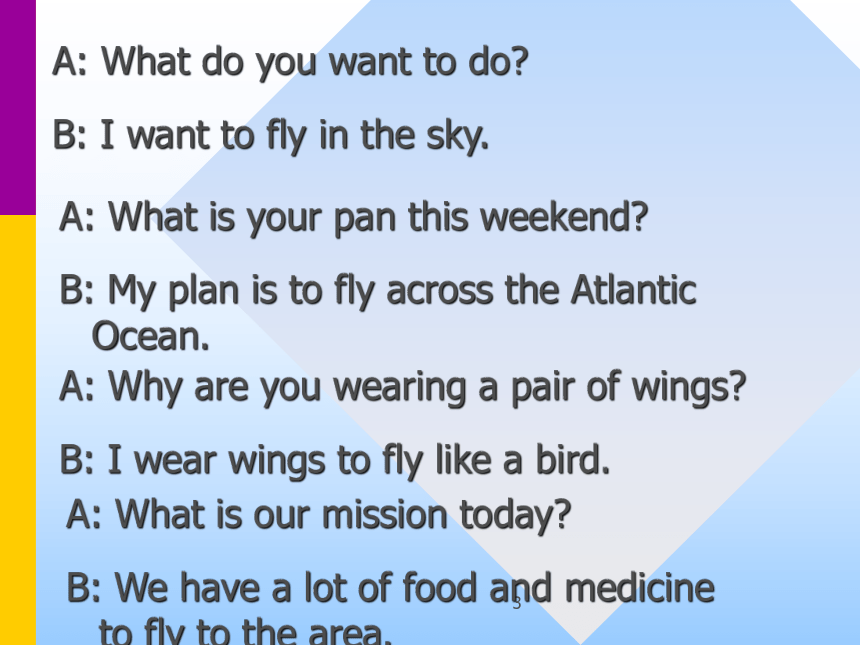

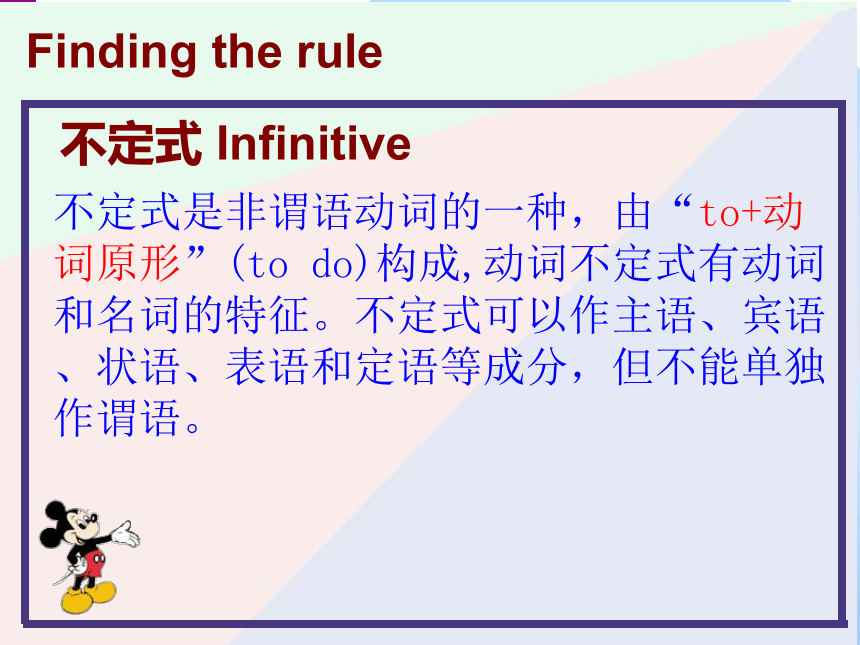
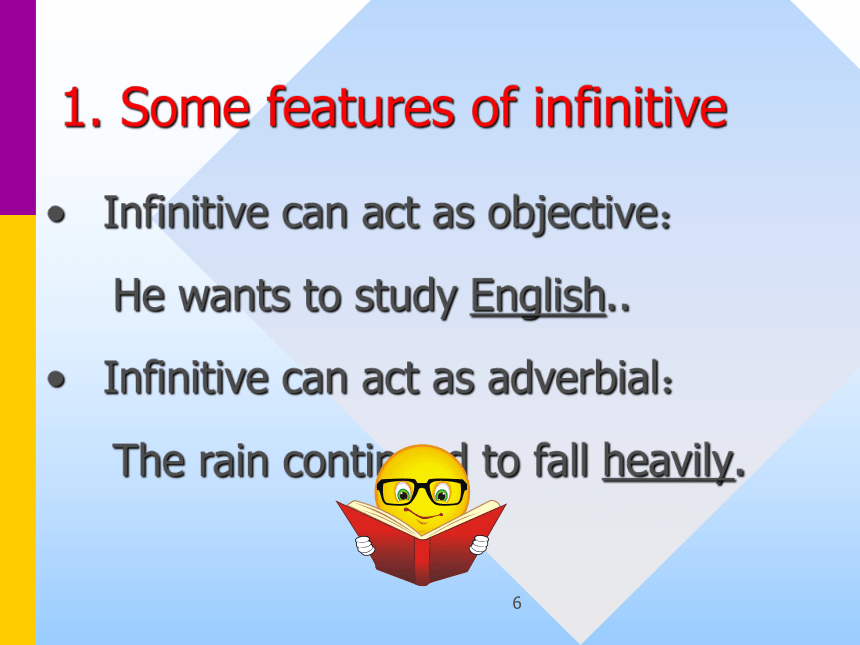
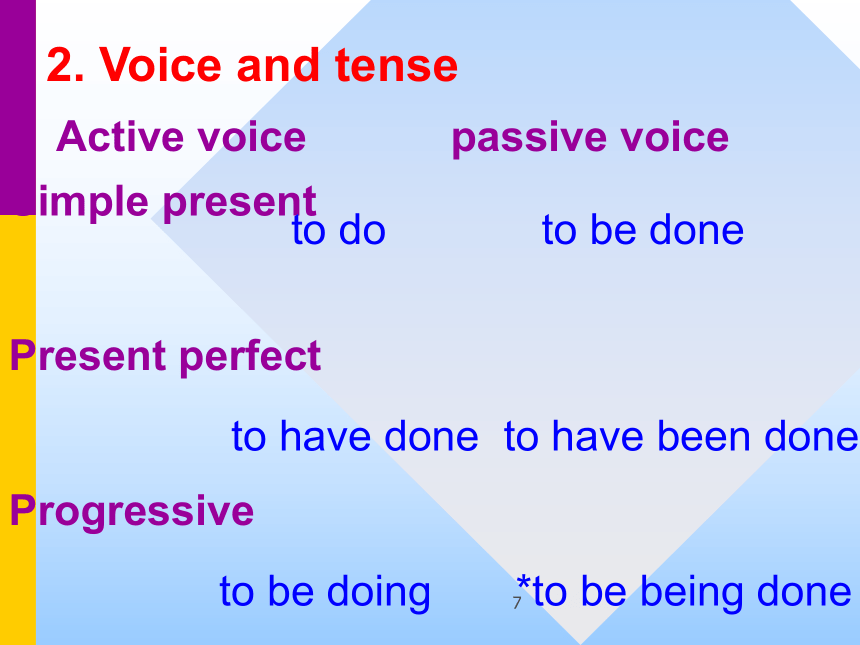
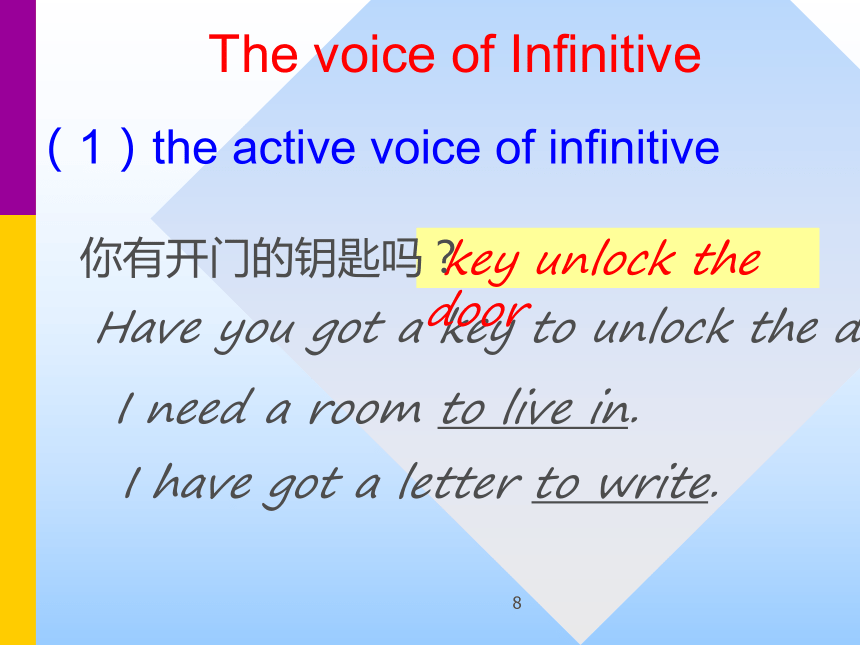
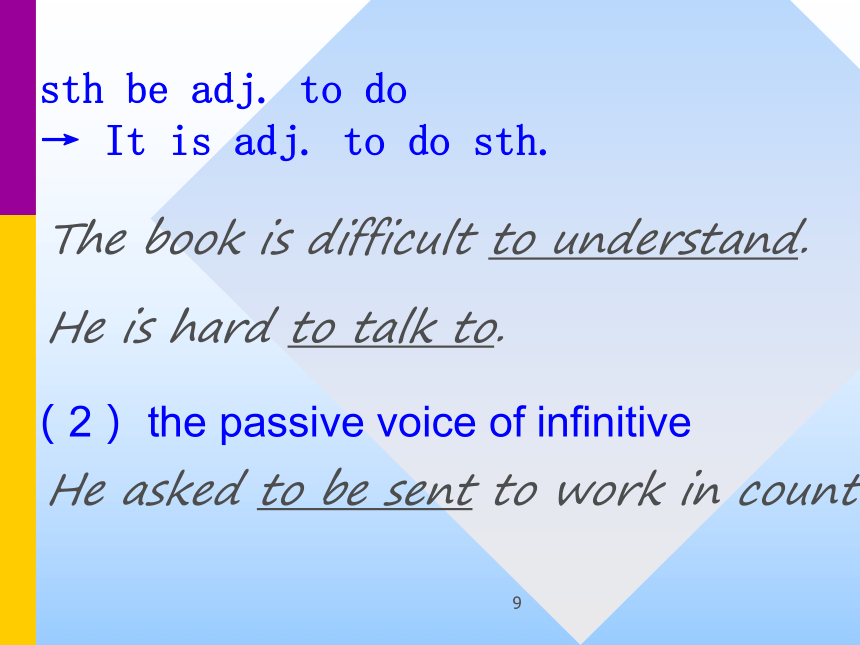
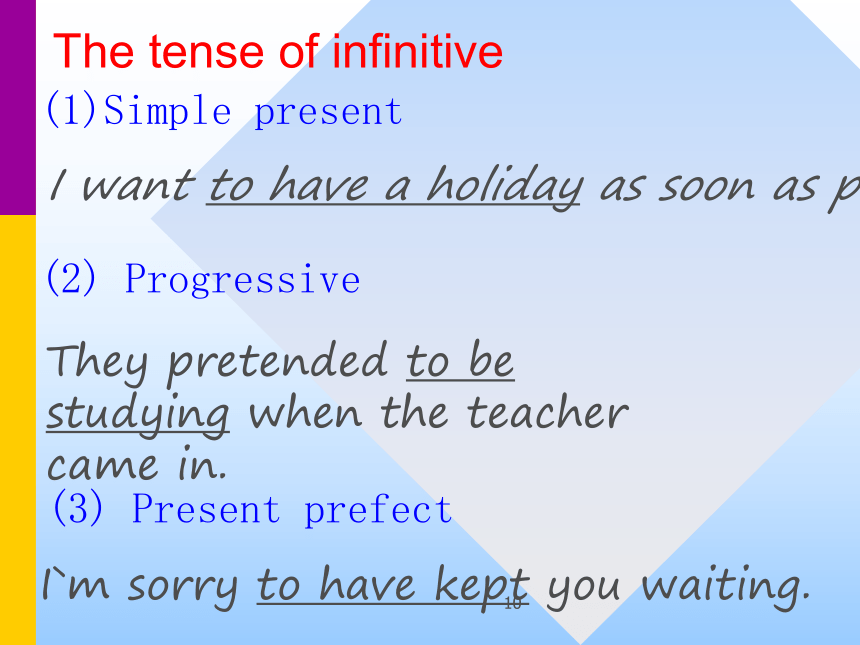
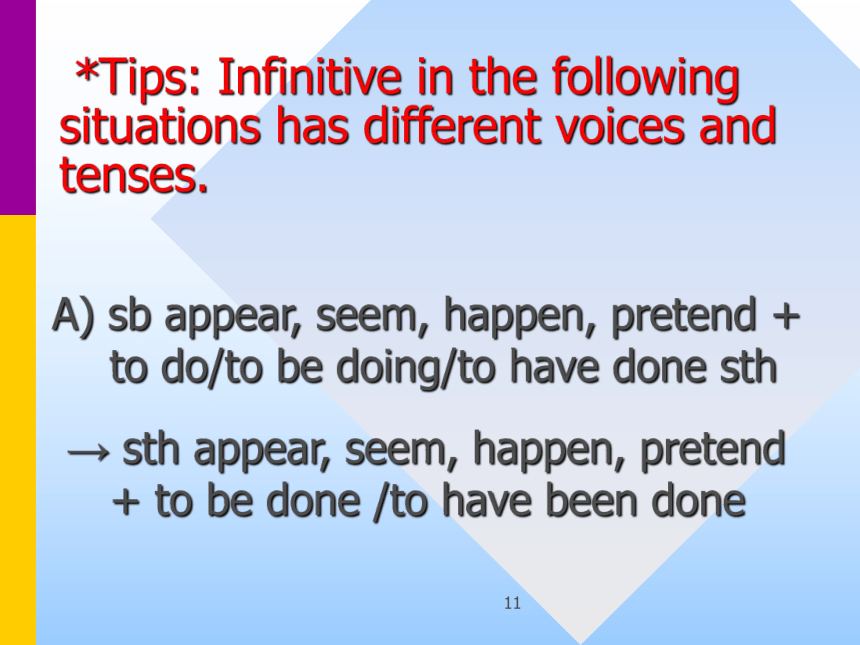

文档简介
(共37张PPT)
*
*
Dialogue practice
Studying the rule
Perform the dialogue and pay attention to the different part of speech of “to fly” in each sentence.
A: What was your dream in childhood
B: To fly was my dream.
*
A: What do you want to do
B: I want to fly in the sky.
A: What is your pan this weekend
B: My plan is to fly across the Atlantic Ocean.
A: Why are you wearing a pair of wings
B: I wear wings to fly like a bird.
A: What is our mission today
B: We have a lot of food and medicine to fly to the area.
*
Display of some sentences
I want to be a teacher when I grow up.
To be a teacher is my dream.
My dream is to be a teacher.
My parents want me to be a teacher.
I have a great dream to realize.
This dream of to be a teacher needs to be realized.
*
不定式是非谓语动词的一种,由“to+动词原形”(to do)构成,动词不定式有动词和名词的特征。不定式可以作主语、宾语、状语、表语和定语等成分,但不能单独作谓语。
不定式 Infinitive
Finding the rule
*
1. Some features of infinitive
Infinitive can act as objective:
He wants to study English..
Infinitive can act as adverbial:
The rain continued to fall heavily.
*
Simple present
Present perfect
Progressive
Active voice passive voice
to do to be done
to have done to have been done
to be doing *to be being done
2. Voice and tense
*
The voice of Infinitive
Have you got a key to unlock the door
key unlock the door
你有开门的钥匙吗?
(1)the active voice of infinitive
I need a room to live in.
I have got a letter to write.
*
sth be adj. to do
→ It is adj. to do sth.
The book is difficult to understand.
He is hard to talk to.
(2) the passive voice of infinitive
He asked to be sent to work in countryside.
*
(1)Simple present
(2) Progressive
(3) Present prefect
They pretended to be studying when the teacher came in.
I`m sorry to have kept you waiting.
I want to have a holiday as soon as possible .
The tense of infinitive
*
A) sb appear, seem, happen, pretend + to do/to be doing/to have done sth
→ sth appear, seem, happen, pretend + to be done /to have been done
*Tips: Infinitive in the following situations has different voices and tenses.
*
b) sb be said, known, reported, believed, claimed…+ to do/to be doing/to have done
→ sb be said, known, reported, believed, claimed…+ to be done//to have been done
c) sb be + adj. + to do sth
*
3. The composite structure of infinitive
for + n/ pronoun + to do
For us to learn foreign languages is important.
→ It is important for us to learn foreign languages.
Can you arrange for a car to take us there
*
4. The negative of infinitive
not to do
He decided not to go home.
I am sorry not to have helped you.
He doesn’t want to give us a hand.
*
5. The Grammatical Function of Infinitive
(1) Act as Subject
To talk with him is a great pleasure.
It is a great pleasure to talk with him.
Generally speaking, the infinitive can be replaced by “it” acting as subject
*
* It is/was +adj.+ for/of sb. to do…
eg: It is brave of him to save the girl in the water.
e.g.: kind, nice, good, brave, clever, wise, stupid, foolish, honest, careless, cruel, generous etc.
*It is +adj.+for sb.+to do…
eg.1: It is not difficult for us to learn English well.
e.g.:difficult, wonderful, meaningful, painful, useful
The logic subject of infinitive
*
such words can be used in this structure: ready, eager, sure, glad, anxious, sorry, afraid, free, pleased, willing…
★such structures as “what to do, where to go” can be the object of tell, ask, know, show etc.
want, hope, wish, ask, choose, decide, manage, offer, promise, refuse, seek, pretend, learn, afford, need…
I don’t know what to do.
(2) act as object
Would you like to watch TV
*
If infinitive act as object which has complement we should use the following structure.
S+ V+ it+ Complement + to do
e.g.: Marx found it important to
study the situation in Russia.
such following words can be used in this structure:
think, believe, feel, consider, make
*
(3) act as predictive
My plan is to finish the experiment on time.
(4) act as object complement
I asked him to come to my office.
注意不定式的省略
①hear, see, watch, notice等感官动词后
I heard her sing this song.
②have, let, make三个使役动词后
I made him stand outside.
这两类省略的不定式一旦变成被动语态,不定式要补充完整.
She was heard to...
He was made to ...
*
(5)act as attribute
Infinitive should be put behind the noun or pronoun
I have a meeting to attend.
Tips: if the infinitive is intransitive and the noun it modified is place or toll, we should add the necessary preposition.
He found a good house to live in.
*
The child has nothing to worry about.
Do you have a pen to write with
*
(6) act as adverbial
① adverbial of purpose
We do as much as we can to make our world beautiful.
Tips: When the infinitive is at the beginning of a sentence, the logic subject is the real subject
To save money, every means has been tried.
To save money, he has tried every means.
To learn English well, a dictionary is needed.
To learn English well, he needs a dictionary.
*
② adverbial of result
He hurried to the school to find nobody there.
③adverbial of reason
We were very excited to hear the news.
④act as independent element
This independent element is used to express speaker’s attitude and explain the whole sentence.
To tell you the truth, I don't like the way
he talked.
*
不定式的省略(the ellipsis of infinitive)
当不定式在某些词后充当成分时,常可省略动词原形,但要保留不定式的符号“to”
(1) infinitive after the verb:happy, glad, eager, anxious, ready…
---Would you mind looking after my cat
---Not at all. I am happy to.
(2) infinitive after the adj: like, love, care, wish , hope, want, expect, prefer, mean, try, oblige, advise, persuade…
---Will you go to the cinema with us
---Sorry, I don’t want to.
*
(3)the ellipsis of complement: ask, tell, order, persuade, advise, permit, allow…
The boy wants to ride his bike in the street, but his mother tells him not to.
(4) some fixed phrases:ought to, have to, used to, be able to,be going to
---Alice, why didn’t you come yesterday
---I was going to, but I had an unexpected visitor.
*
及物动词want, need, require等,当其主语是“物”时,表示“需要”,常用动词不定式的被动式作宾语。
(=want,need,require+doing)
Your bedroom needs to be
cleaned.
=Your bedroom needs cleaning.
*
Apply the rule
1. Tell the usages of the infinitives in the following sentences
1.) Dr. Bush wants to have a sound sleep. ( )
For example: I hope to see you soon. (object)
2.)To climb the high mountain seems an impossible task to my grandparents. ( )
*
6.) Tom found it easy to master a foreign language. ( )
7.) He often goes to the cyber café to chat with his on-line friends. ( )
5.) My wish is to become a physicist. ( )
4.) What do you think is the right thing to do ( )
3.) It is possible to finish the work in a week’s time. ( )
*
2. Translate the following sentences into English by using infinitive.
1.) It is unbelievable______________(一年之内要修好这座桥)
2.)He is always__________________(第一个到学校)
3.)We find it interesting____________(通过电脑游戏学英语)
4.)We decided________________(把计划做点改动)
*
7.) I am not so foolish as____________(相信他所说的话)
6.) She is sure____________(通过考试)
5.) It is a pleasure____________(和他谈话)
*
Exercises:
1. The purpose of new technologies is to make life easier ________ it more difficult.
not make B. not to make
C. not making D. do not make
*
2. I’ve worked with children before, so I know what ______ in my new job.
Expected B. to expect
C. to be expecting D. expects
3. Having a trip abroad is certainly good for the old couples but it remains ______ whether they will enjoy it.
to see B. to be seen
C. seeing D. seen
*
4. Charles Babbage is generally considered _____the first computer.
to invent B. inventing
C. to have invented D. having invented
5. Allen had to call a taxi because the box was _______ to carry all the way home.
A. much too heavy B. too much heavy
C. heavy too much D. too heavy much
*
6. The boy wanted to ride his bicycle in the street, but his mother told him ______.
to be chosen B. to choose from
C. to choose D. for choosing
7. Little Jim should love _____ to the theatre this evening.
to be taken B. to take
C. being taken D. taking
*
8.There are five pairs ___,but I'm at a loss which to buy.
not to B. not to do
C. not do it D. do not to
9.____late in the afternoon, Bob turned off the alarm.
A. To sleep B. Sleeping
C. Sleep D. Having sleep
*
10.With a lot of difficult problems___, the newly-elected president is having a hard time
A. settled B. settling
C. to settle D. being settled
*
*
*
Dialogue practice
Studying the rule
Perform the dialogue and pay attention to the different part of speech of “to fly” in each sentence.
A: What was your dream in childhood
B: To fly was my dream.
*
A: What do you want to do
B: I want to fly in the sky.
A: What is your pan this weekend
B: My plan is to fly across the Atlantic Ocean.
A: Why are you wearing a pair of wings
B: I wear wings to fly like a bird.
A: What is our mission today
B: We have a lot of food and medicine to fly to the area.
*
Display of some sentences
I want to be a teacher when I grow up.
To be a teacher is my dream.
My dream is to be a teacher.
My parents want me to be a teacher.
I have a great dream to realize.
This dream of to be a teacher needs to be realized.
*
不定式是非谓语动词的一种,由“to+动词原形”(to do)构成,动词不定式有动词和名词的特征。不定式可以作主语、宾语、状语、表语和定语等成分,但不能单独作谓语。
不定式 Infinitive
Finding the rule
*
1. Some features of infinitive
Infinitive can act as objective:
He wants to study English..
Infinitive can act as adverbial:
The rain continued to fall heavily.
*
Simple present
Present perfect
Progressive
Active voice passive voice
to do to be done
to have done to have been done
to be doing *to be being done
2. Voice and tense
*
The voice of Infinitive
Have you got a key to unlock the door
key unlock the door
你有开门的钥匙吗?
(1)the active voice of infinitive
I need a room to live in.
I have got a letter to write.
*
sth be adj. to do
→ It is adj. to do sth.
The book is difficult to understand.
He is hard to talk to.
(2) the passive voice of infinitive
He asked to be sent to work in countryside.
*
(1)Simple present
(2) Progressive
(3) Present prefect
They pretended to be studying when the teacher came in.
I`m sorry to have kept you waiting.
I want to have a holiday as soon as possible .
The tense of infinitive
*
A) sb appear, seem, happen, pretend + to do/to be doing/to have done sth
→ sth appear, seem, happen, pretend + to be done /to have been done
*Tips: Infinitive in the following situations has different voices and tenses.
*
b) sb be said, known, reported, believed, claimed…+ to do/to be doing/to have done
→ sb be said, known, reported, believed, claimed…+ to be done//to have been done
c) sb be + adj. + to do sth
*
3. The composite structure of infinitive
for + n/ pronoun + to do
For us to learn foreign languages is important.
→ It is important for us to learn foreign languages.
Can you arrange for a car to take us there
*
4. The negative of infinitive
not to do
He decided not to go home.
I am sorry not to have helped you.
He doesn’t want to give us a hand.
*
5. The Grammatical Function of Infinitive
(1) Act as Subject
To talk with him is a great pleasure.
It is a great pleasure to talk with him.
Generally speaking, the infinitive can be replaced by “it” acting as subject
*
* It is/was +adj.+ for/of sb. to do…
eg: It is brave of him to save the girl in the water.
e.g.: kind, nice, good, brave, clever, wise, stupid, foolish, honest, careless, cruel, generous etc.
*It is +adj.+for sb.+to do…
eg.1: It is not difficult for us to learn English well.
e.g.:difficult, wonderful, meaningful, painful, useful
The logic subject of infinitive
*
such words can be used in this structure: ready, eager, sure, glad, anxious, sorry, afraid, free, pleased, willing…
★such structures as “what to do, where to go” can be the object of tell, ask, know, show etc.
want, hope, wish, ask, choose, decide, manage, offer, promise, refuse, seek, pretend, learn, afford, need…
I don’t know what to do.
(2) act as object
Would you like to watch TV
*
If infinitive act as object which has complement we should use the following structure.
S+ V+ it+ Complement + to do
e.g.: Marx found it important to
study the situation in Russia.
such following words can be used in this structure:
think, believe, feel, consider, make
*
(3) act as predictive
My plan is to finish the experiment on time.
(4) act as object complement
I asked him to come to my office.
注意不定式的省略
①hear, see, watch, notice等感官动词后
I heard her sing this song.
②have, let, make三个使役动词后
I made him stand outside.
这两类省略的不定式一旦变成被动语态,不定式要补充完整.
She was heard to...
He was made to ...
*
(5)act as attribute
Infinitive should be put behind the noun or pronoun
I have a meeting to attend.
Tips: if the infinitive is intransitive and the noun it modified is place or toll, we should add the necessary preposition.
He found a good house to live in.
*
The child has nothing to worry about.
Do you have a pen to write with
*
(6) act as adverbial
① adverbial of purpose
We do as much as we can to make our world beautiful.
Tips: When the infinitive is at the beginning of a sentence, the logic subject is the real subject
To save money, every means has been tried.
To save money, he has tried every means.
To learn English well, a dictionary is needed.
To learn English well, he needs a dictionary.
*
② adverbial of result
He hurried to the school to find nobody there.
③adverbial of reason
We were very excited to hear the news.
④act as independent element
This independent element is used to express speaker’s attitude and explain the whole sentence.
To tell you the truth, I don't like the way
he talked.
*
不定式的省略(the ellipsis of infinitive)
当不定式在某些词后充当成分时,常可省略动词原形,但要保留不定式的符号“to”
(1) infinitive after the verb:happy, glad, eager, anxious, ready…
---Would you mind looking after my cat
---Not at all. I am happy to.
(2) infinitive after the adj: like, love, care, wish , hope, want, expect, prefer, mean, try, oblige, advise, persuade…
---Will you go to the cinema with us
---Sorry, I don’t want to.
*
(3)the ellipsis of complement: ask, tell, order, persuade, advise, permit, allow…
The boy wants to ride his bike in the street, but his mother tells him not to.
(4) some fixed phrases:ought to, have to, used to, be able to,be going to
---Alice, why didn’t you come yesterday
---I was going to, but I had an unexpected visitor.
*
及物动词want, need, require等,当其主语是“物”时,表示“需要”,常用动词不定式的被动式作宾语。
(=want,need,require+doing)
Your bedroom needs to be
cleaned.
=Your bedroom needs cleaning.
*
Apply the rule
1. Tell the usages of the infinitives in the following sentences
1.) Dr. Bush wants to have a sound sleep. ( )
For example: I hope to see you soon. (object)
2.)To climb the high mountain seems an impossible task to my grandparents. ( )
*
6.) Tom found it easy to master a foreign language. ( )
7.) He often goes to the cyber café to chat with his on-line friends. ( )
5.) My wish is to become a physicist. ( )
4.) What do you think is the right thing to do ( )
3.) It is possible to finish the work in a week’s time. ( )
*
2. Translate the following sentences into English by using infinitive.
1.) It is unbelievable______________(一年之内要修好这座桥)
2.)He is always__________________(第一个到学校)
3.)We find it interesting____________(通过电脑游戏学英语)
4.)We decided________________(把计划做点改动)
*
7.) I am not so foolish as____________(相信他所说的话)
6.) She is sure____________(通过考试)
5.) It is a pleasure____________(和他谈话)
*
Exercises:
1. The purpose of new technologies is to make life easier ________ it more difficult.
not make B. not to make
C. not making D. do not make
*
2. I’ve worked with children before, so I know what ______ in my new job.
Expected B. to expect
C. to be expecting D. expects
3. Having a trip abroad is certainly good for the old couples but it remains ______ whether they will enjoy it.
to see B. to be seen
C. seeing D. seen
*
4. Charles Babbage is generally considered _____the first computer.
to invent B. inventing
C. to have invented D. having invented
5. Allen had to call a taxi because the box was _______ to carry all the way home.
A. much too heavy B. too much heavy
C. heavy too much D. too heavy much
*
6. The boy wanted to ride his bicycle in the street, but his mother told him ______.
to be chosen B. to choose from
C. to choose D. for choosing
7. Little Jim should love _____ to the theatre this evening.
to be taken B. to take
C. being taken D. taking
*
8.There are five pairs ___,but I'm at a loss which to buy.
not to B. not to do
C. not do it D. do not to
9.____late in the afternoon, Bob turned off the alarm.
A. To sleep B. Sleeping
C. Sleep D. Having sleep
*
10.With a lot of difficult problems___, the newly-elected president is having a hard time
A. settled B. settling
C. to settle D. being settled
*
同课章节目录
- 3
- Unit 1 Friends and Friendship
- Unit 2 Between Parents and Us
- Unit 3 Motherly Love
- Unit 4 Dreams
- Unit 5 Wishes and Ambitions
- Unit 6 Perseverance
- Unit 7 Art
- Unit 8 Drama
- Unit 9 Poetry
- 4
- Unit 1 Project Hope
- Unit 2 Three Gorges
- Unit 3 Countries and Regions
- Unit 4 Plants
- Unit 5 Animals
- Unit 6 Man and Pets
- Unit 7 Neighborhood
- Unit 8 Workplace
- Unit 9 Living Today
